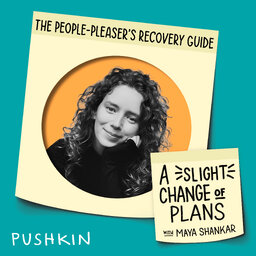Stick to your Goals with Dr. Maya Shankar on Slate's How To! Podcast
It's only March and we're already starting to veer off track with our resolutions for the year. Don't worry! 90% of people fail to reach their goals each year, which means there's got to be a better way. On this episode of How To!, a listener named Emily is feeling discouraged by her eating habits and lack of exercise. Maya, a behavioral scientist, helps Emily (and the rest of us!) form better habits so we can set ourselves up for success.
Hear more episodes of How To! wherever you listen to podcasts.
 A Slight Change of Plans
A Slight Change of Plans


